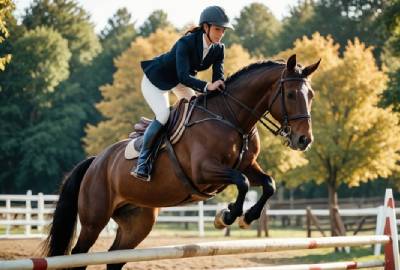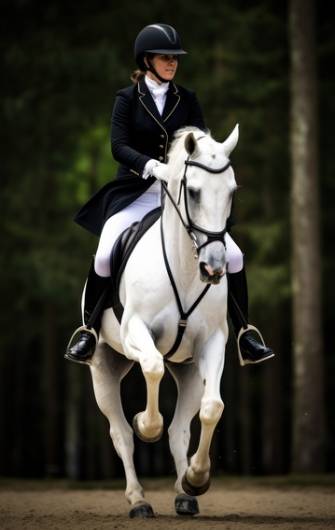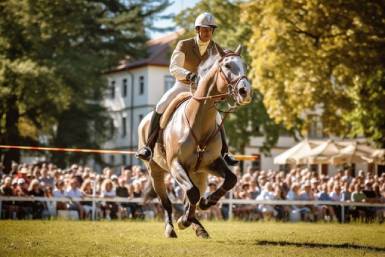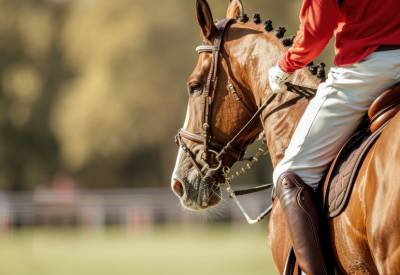Saddle Up for the Most Exciting Equestrian Events in NZ
Equestrian sports in New Zealand are more than just a pastime; they embody a unique blend of tradition, athleticism, and community spirit. With its wide open spaces, natural landscapes, and a deep connection to horses, New Zealand has become a global hub for equestrian events. Whether it's the precision of dressage, the high-flying excitement of show jumping, or the demanding endurance of cross-country competitions, New Zealand's equestrian competitions offer something for every type of rider and spectator.
These events not only celebrate the bond between horse and rider but also highlight the country's rich cultural ties to equestrian traditions that have been passed down through generations. The competitions, both local and international, serve as a stage for riders to showcase their hard work and dedication, drawing spectators from around the world.
Why Equestrian Sports Are Gaining Popularity in New Zealand

The love for equestrian sports has steadily grown in New Zealand over recent years. A rising interest in outdoor activities, a deep cultural connection to the land, and an increasing number of facilities and events available to enthusiasts fuel this growth. More New Zealanders are turning to horse riding, whether for recreational enjoyment or as a competitive pursuit. Equestrian sports have become a pathway for personal growth, offering opportunities to build discipline, confidence, and a strong bond with animals.
With the expansion of equestrian schools and training centers, more riders are able to access world-class coaching, further fostering the talent that New Zealand is known for. As a result, competitions now attract a diverse range of participants, from young children taking their first riding lessons to seasoned professionals seeking national and international recognition.
Exploring the Diverse World of Equestrian Disciplines
Equestrian sports in New Zealand are diverse, offering multiple disciplines that challenge both horse and rider in different ways. These competitions are not just about speed or strength but also skill, strategy, and artistry. Some of the most popular disciplines include:
Dressage
Dressage is a sport often compared to ballet due to its emphasis on precision, smoothness, and grace. It involves riders performing a series of movements called "tests," which are judged based on the horse's responsiveness, accuracy, and overall fluidity.
This discipline requires an extraordinary level of training, both for the horse and the rider, who must maintain constant communication with their animal. New Zealand has a strong tradition of success in dressage, with riders regularly placing at international competitions.
Show Jumping
Show jumping tests the agility, speed, and coordination of both horse and rider. In a typical show jumping competition, riders navigate their horses over a series of jumps within a set time limit. The challenge lies in balancing speed with accuracy, as knocking over a pole or missing a jump results in penalties. Show jumping is an exciting sport known for its fast-paced action and high-energy atmosphere, attracting large crowds at major events.
Eventing
Often described as the ultimate test of versatility, eventing combines three distinct disciplines: dressage, cross-country, and show jumping. Riders must be proficient in all three, as they are required to perform a dressage test, complete a challenging cross-country course that includes natural obstacles like ditches and water, and clear show jumps in an arena. Eventing is a true test of stamina, skill, and mental resilience for both horse and rider, making it one of the most exciting events to watch.
Endurance Riding
Endurance riding is one of the most physically demanding equestrian disciplines. Horses and riders compete in long-distance races, often covering distances of 80 to 160 kilometers in a single day. These races not only test the stamina of the horse but also the rider's ability to manage pace, nutrition, and hydration over long periods. New Zealand has a strong presence in endurance riding, with some of the world's top endurance riders hailing from the country.
Top Equestrian Events You Can't-Miss in New Zealand
New Zealand is home to several prestigious equestrian events, each with its unique flair. These competitions attract top-tier riders and spectators from all over the world and showcase the best talent the country has to offer. Notable events include:

-
The NZ Horse of the Year Show: Held annually in Hastings, the Horse of the Year Show is arguably the most significant equestrian event in New Zealand. It is a week-long celebration of equestrian sport that includes a range of competitions in show jumping, dressage, and eventing. The show attracts thousands of visitors, with both locals and international competitors vying for the coveted "Horse of the Year" title.
In addition to the competitions, the event includes a large trade show showcasing everything from riding gear to horse care products.
- The National Equestrian Championships: Every year, the National Equestrian Championships bring together riders from across New Zealand to compete for national titles in various disciplines, including dressage, eventing, and show jumping. The event is crucial for riders aiming to make their mark on the national equestrian scene, offering them the chance to qualify for international events.
- The Canterbury A&P Show: The Canterbury A&P Show in Christchurch is an iconic agricultural and pastoral event featuring a large equestrian component. Competitions in show jumping, dressage, and other disciplines draw large crowds and showcase the diversity of New Zealand's equestrian talent. It's an event that celebrates rural life and agricultural practices while providing thrilling equestrian action for all ages.
- The Auckland Polo Open: Polo, often dubbed "the sport of kings," has grown significantly in popularity in New Zealand. The Auckland Polo Open is one of the biggest polo events in the country, attracting top players from both New Zealand and abroad. The event brings together a combination of high-level competition and a vibrant social atmosphere, making it a must-attend event for polo fans.
How Equestrian Competitions Boost New Zealand's Economy

Equestrian competitions are an important economic driver in New Zealand, with events attracting participants, spectators, and tourists from both domestic and international markets. Events like the Horse of the Year Show and the National Equestrian Championships generate significant revenue through ticket sales, sponsorships, and the associated tourism industry. Competitors, many of whom travel with their horses, contribute to local businesses by staying in accommodations, dining in local restaurants, and purchasing goods related to the sport.
Additionally, the equestrian industry itself—comprising horse breeding, training, equipment, and healthcare—supports thousands of jobs and contributes significantly to the country's rural economy.
What It Takes to Train for Equestrian Success
Training for equestrian competitions is a long-term commitment that requires dedication, time, and resources. Riders must spend countless hours refining their skills while horses undergo rigorous training to ensure they are in peak physical and mental condition. Here are some of the key elements of successful equestrian training:

- Daily Training: Riders typically train their horses daily, focusing on different aspects of performance. Dressage riders hone their horses' precision, balance, and obedience while show jumpers practice agility and speed. Eventing riders require cross-training, with consistent practice in all three disciplines. Each training session is carefully planned to build the horse's strength, endurance, and responsiveness to commands.
- Fitness and Conditioning: Horses, just like athletes, need to be in top physical condition for competition. This includes regular exercises to improve their strength, flexibility, and stamina. Many riders also engage in specialized training methods such as swimming, hill work, or lunging to target specific areas of fitness. Conditioning ensures that the horse remains injury-free and is capable of handling the physical demands of competition.
- Mental Preparation: Equestrian sports are as much a mental game as they are a physical one. Horses must be calm, focused, and responsive, which often involves desensitization to various stimuli and experiences. Similarly, riders need to develop mental resilience, manage stress and make decisions under pressure. A positive mindset, combined with proper training, is essential for success in any discipline.
The Power of the Rider-Horse Connection
At the heart of every successful equestrian competition is the unique connection between the horse and rider. This bond is built on trust, communication, and respect. Horses respond to the subtle cues given by their riders, and successful riders know how to foster a deep understanding of their horses' personalities and needs. The relationship between horse and rider is cultivated over time, and it is this mutual trust that often leads to winning performances.
Many riders spend years with their horses, developing a deep, almost intuitive understanding of each other. The stronger the bond, the more in tune the horse is with the rider's instructions, leading to better performance and a more harmonious partnership.
What Lies Ahead for Equestrian Competitions in New Zealand
The future of equestrian sport and horse racing in New Zealand is looking extremely bright. With the popularity of the sports continuing to grow, the opportunities for young riders are also growing. Equestrian Sports New Zealand (ESNZ) is actively developing talent, bringing events to New Zealand, and supporting equestrian facility development around New Zealand.
In addition, technology for the care of horses, such as wearable sensors and performance tracking, is transforming the way that riders train and compete. Riders are now able to focus on their horses' performance with these innovations, leading to even more competitive competition. With equestrian sports gaining popularity not just as a recreational activity but as a competitive activity as well, New Zealand will remain a force in the global world of equestrian competition.
Conclusion
New Zealand's equestrian disciplines still captivate audiences and competitors alike with their combination of tradition, skill, and athleticism. Whether it's the exacting nuances of dressage, the spectacular thrill of show jumping, or the endurance-testing rigours of eventing and endurance riding, equestrian competition in New Zealand is a great and exciting spectacle. The close relationship between horse and rider, combined with the inherent beauty of the countryside and the country's improving equestrian infrastructure, ensures that these events will remain a well-liked and fundamental component of New Zealand's sporting life for many years to come.
